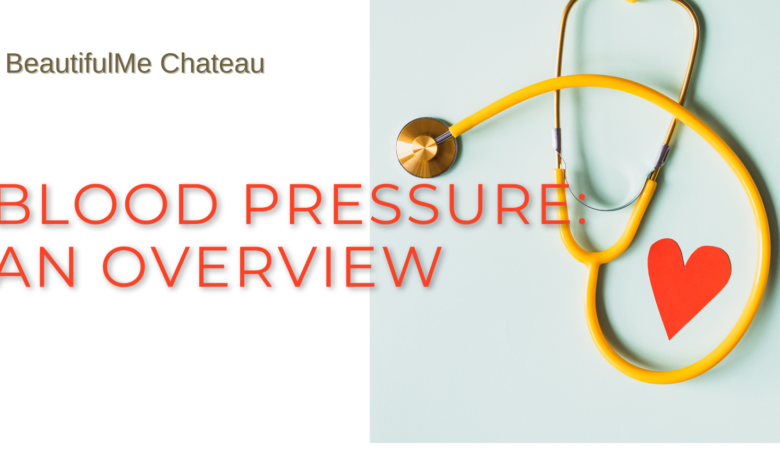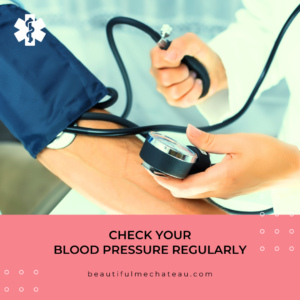Blood Pressure: An Overview

Blood pressure is a measurement of the pressure exerted by the circulating blood on the walls of the arteries, veins, and chambers of the heart. it is the force exerted by circulating blood on the walls of the blood vessels. Maintaining healthy blood pressure is crucial to maintaining a healthy and enhanced overall well-being.
Table of Contents
Blood pressure is measured in the context of systolic and diastolic activities. When the ventricles in the heart contract, it is termed a systolic activity, while the relaxing ventricles mark a diastolic activity.
It is highest during the systole activity and lowest during the diastole activity. The unit of measuring blood pressure is millimeters. A normal blood pressure reading is 120/80 mmHg. When blood pressure is high, it may damage the blood vessels, heart, and kidneys. These conditions may lead to heart attack, stroke, and other serious problems.
A healthy person maintains a blood pressure reading of 120/80 mmHg. A deviation from this normal reading can result in a blood pressure disorder. There are basically two abnormal conditions of blood pressure. They are known as high blood pressure or hypertension and low blood pressure or hypotension.
High Blood Pressure/ Hypertension
A person is known to suffer from high blood pressure when their measurement of blood pressure increases over that of a normal reading. A normal blood pressure is 120/80 mmHg. When it increases to 140/ 90 mmHg, the person is known to have high blood pressure.
High blood pressure is often termed as ‘a silent killer’. You might be suffering from high blood pressure for a long time and not know it at all. However, when a person develops high blood pressure, it usually lasts for a lifetime.
About 90-95 percent of the causes of hypertension are unknown. However several factors may lead to high blood pressure like obesity, excessive alcohol consumption, family background of high blood pressure, consuming excess salt, and getting older.
One’s blood pressure may also rise if he or she is living a sedentary lifestyle and is not eating sufficient potassium and calcium. Hardening of the arteries (arteriosclerosis) thickening of the artery wall, and too much contraction of the small arteries may also cause hypertension.
Why High Blood Pressure?
Your heart pumps the blood and supplies it to the various organs of your body via arteries. The arteries, when leaving your heart, narrow into arterioles. The arterioles further narrow themselves into capillaries. These capillaries supply oxygen and nutrients to the various body organs.
Due to certain nerve impulses, the arteries become dilated or contracted. If the arteries become contracted, the passage of blood is hampered and it increases the pressure of blood. The condition causes high blood pressure or hypertension.
This condition strains your heart and can even damage your blood vessels. If the vessels get damaged, the blood supply can further affect various body organs connected to the damaged vessels.
The human body generally bears and handles this sudden increase in pressure for a while. This is one of the sole reasons for the fact that you can live your whole life, without any ill effects or symptoms, from high blood pressure.
High blood pressure does not usually cause symptoms this explains why this ailment can go undetected for many years. This may result in progressive damage to major organs like the heart, kidneys, liver, and blood vessels.
In addition to these conditions, high blood pressure can cause the tiny capillaries in the eye to bleed. However, symptoms of high blood pressure are noticeable in some people. These symptoms may include headache, blurred vision, nausea, and chronic fatigue.
Types of High Blood Pressure
There are two forms of high blood pressure, essential hypertension, and secondary hypertension. Around 95 % of hypertension cases are related to essential hypertension. The cause of essential hypertension is multifold though.
Several factors result in essential hypertension. One of the major factors is high salt intake. Other factors that can contribute to the cause of essential hypertension are tobacco smoking, alcohol abuse, obesity, diabetes mellitus, a sedentary lifestyle, and genetic causes.
Secondary hypertension amounts to at least 5 % of the cases of hypertension. The factors contributing to secondary hypertension are pregnancy, a slow pulse, drugs, kidney diseases, certain types of cancers, malformed aorta, and aortic valve disease.
High blood pressure largely remains undetected in its first stage of occurrence. A person would probably never know about it. But if the condition of high blood pressure prolongs, it can cause serious damage to the various body organs. High blood pressure can directly affect the person in the form of kidney failure, congestive heart failure, or heart attack.
Treatment For High Blood Pressure
Treatment for high blood pressure depends on how high the blood pressure is. Health conditions like diabetes, or whether any organs have been damaged are critical in treating high blood pressure. Individuals with high blood pressure may lower their blood pressure by making healthy changes in their daily activities and food regimens. Medication can be taken if those lifestyle changes don’t work.
Low Blood Pressure/ Hypotension
In the medical terms, low blood pressure is called hypotension. A person is said to have low blood pressure disorder if his blood pressure falls below the normal reading of 120/80 mmHg.
Why Low Blood Pressure?
There are many causes of low blood pressure. Among the common causes include acute illness. The condition can be characterized by symptoms such as severe blood loss, infection, fluid loss, or damage to the heart. The age factor plays an important role in low blood pressure. Increasing age causes your arteries to stiffen and cause a drop in the pressure of blood.
Damage to adrenal glands can also lead to low blood pressure conditions. Damage to adrenal glands affects the production of aldosterone in your body. This hormone controls the salt amounts in the body. If the aldosterone hormone gets affected, it leads to the loss of salt from your body, further resulting in low blood pressure. This causes dizziness when you stand up. Low blood pressure can also be caused due to the usage of diuretics.

A person with low blood pressure shows symptoms like chest pain, headache, prolonged diarrhea, or vomiting. The person also suffers from a burning sensation during urination, a stiff neck, a high fever, and an irregular heartbeat. The person may sometimes suffer from shortness of breath and a cough with phlegm.
Normal is healthy!
Neither high blood pressure nor low blood pressure is good for your body and health. You should get your blood pressure checked regularly for either of these two disorders. Properly treating and controlling your blood pressure will definitely enable you to live a healthy and happy life!
Lifestyle Changes That Are Essential in Preventing High Blood Pressure
- Lose extra weight
Eat less salt
Exercise
Limit alcohol to 2 drinks a day for men and 1 drink a day for women and lighter-weight men
Get 3,500 mg of potassium in your diet every day. - Fresh, unprocessed whole foods have the most potassium. These foods include meat, fish, nonfat and low-fat dairy products, and many fruits and vegetables.
Consume diets rich in fruits, vegetables, and low-fat dairy products and is low in fat
High blood pressure is a health ailment that many have taken for granted. This condition took the lives of over 40,000 Americans in 2002 alone and about one in three adults suffer from high blood pressure.
People who are concerned about their health should pay attention to their blood pressure. But before making major adjustments in one’s lifestyle, individuals who wish to lower or maintain their blood pressure should seek the approval of doctors and other health experts.
With a proper lifestyle and food regimen, high blood pressure may not be a problem.
Sharing is caring. Spread some love by sharing this post. And remember to follow us on Instagram and Facebook, or subscribe to our newsletter to stay up to date and unlock the secrets to a beautiful you.


